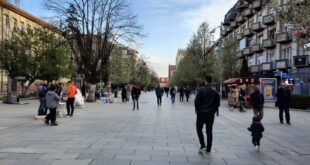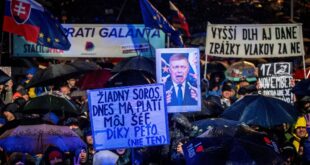A hundred years on from the start of World War I, the city where it all began is putting on a range of events that send a message of peace after a ‘century of wars’.
A hundred years since a historic gunshot was fired in Sarajevo – ‘which started the 20th century in Europe’ – Bosnia’s artists plan to send a symbolic message of peace to the world.
The message will be released from a bridge that stand metres from the spot where a young Serbian nationalist named Gavrilo Princip assassinated the heir to the throne of Austria-Hungary.
The Archduke Franz Ferdinand and his wife, Sophie, who was also killed, were on a visit to Bosnia and Herzegovina, which then formed part of the Habsburg Empire. Within weeks of the killings, Europe was at war.
Alongside a range of other cultural and scientific events dedicated to the centenary, the performance on the ‘Latin’ or so-called ‘Princip’ bridge will take place at around midnight on June 28.
The ‘Century of Peace After a Century of Wars’, the creators of the event said, points to the hope of an end to further conflicts in the region and beyond.
‘Killings in the world have never stopped since a century of wars started in 1914,’ the organizers of the Century of Peace said in their announcement.
‘At least 187 million people died because of the wars in the 20th century. It is the obligation of Sarajevo to send a powerful vision of peace to the world on the symbolic date of June 28, 2014,’ they added.
Haris Pasovic, the theatre director in charge of the programme, recalled that a century of war in Europe had started with the assassination in Sarajevo and had ended with the war in Bosnia from 1992 to 1995.
The artistic performance will focus on hopes of a better future, he explained. ‘From the Latin Bridge, where the bullet… was fired, we are sending a different kind of message this time,’ Pasovic said.
The event will pay tribute to millions of victims of the devastating wars that occurred in the 20th century and tell a story of how terrible wars are and how much the world needs peace.
The musical and stage performance will not delve into modern politics, nor will it refer to the concrete events of 1914, however.
‘I believe the message of love from Sarajevo can be a significant statement of citizens of Bosnia and Herzegovina, but also of the region,’ Pasovic declared.
Many events, one message:
Some events related to the marking of the centenary of the outbreak of war have already started in Sarajevo.
One was the Peace Event Sarajevo 2014, an international gathering of thousands of peace activists and young people from many countries.
Workshops, seminars and round tables have also been organized on different topics related to peace and reconciliation and on dealing with the past.
The statement of the participants of a peace conference in Sarajevo held in early June was that more energy needed to be invested in combating the threat of war, with a wish for conflicts to be solved out in a more peaceful way in future.
The City of Sarajevo has announced other exhibitions and events to mark the centenary, such as the Making Peace Exhibition.
This aims to teach the public about the key elements that are needed to create a ‘sustainable peace’.
The French ambassador to Bosnia, Roland Gilles, recently announced other events dedicated to the beginning of the World War I, which will be implemented by the Sarajevo, Heart of Europe Foundation
‘For almost three years, the Foundation, formed by France and the City of Sarajevo – which many European countries have joined – has prepared cultural events carrying the message of reconciliation and peace for this symbolic year of the centenary of World War I,’ he said.
Sarajevo, Heart of Europe is organizing a cultural programme that will include cultural, educational, artistic and sporting events in the capital, which will be supported by European institutions.
One event planned for June 22 is the international cycling race, sponsored by Tour de France, which will muster cyclists from more than 20 countries. The route forms a circle of some 140 kilometres around the city and its outskirts.
An interdisciplinary conference on events, narratives and memories of 1914, entitled Long Shots of Sarajevo, from June 23 to 29, is to deal with the events of a hundred years ago.
A theatre play by the French philosopher and writer Bernard-Henri Levy, named Hotel Europe, is set to premiere on June 27 in the Sarajevo National Theatre.
The central cultural event, however, will be the concert of the Vienna Philharmonic in the City Hall.
This historic and iconic building finally re-opened in May after two decades of restoration following the fire that destroyed it during the war in 1992.
Can Bosnia send a ‘peace’ message?
While no one questions the sincerity of those organizing the commemorations in Sarajevo, some question whether it is appropriate for Bosnia as a whole to send messages of peace to the world, given its bitterly divided politics.
While war has not returned since 1995, the Balkan country remains hostage to the quarrels of its embittered and entrenched Bosniak, Serbian and Croatian politicians.
International Law professor Zarije Seizovic told Balkan Insight that while Sarajevo as a city could send a message of peace and tolerance, the same could not be said for the country.
‘Sarajevo cannot send that message [of peace] as a representative of Bosnia and Herzegovina,’ he said. ‘Bosnia and Herzegovina as a whole… simply does not have the mandate to send a message of peace,’ he added.
Bosnia’s great problem, he argued, was that little had moved on politically since the Dayton Peace Accords were signed, ending the 1992-5 war.
In the light of that, cultural events pointing to a message of peace in general appeared cosmetic and superficial.
‘Changes for the better can only happen if elections bring a completely new political elite at all levels of government – people who don’t carry the burdens of the old regimes,’ Seizovic noted.
‘But Bosnia and Herzegovina as a ‘political community’ does not seem sufficiently mature to take up and carry on that process’, he concluded.
 Eurasia Press & News
Eurasia Press & News



